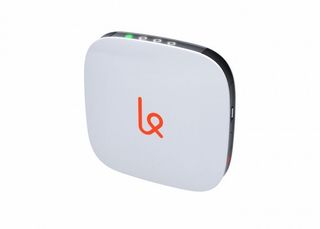Internet connectivity has become the lifeblood of our everyday existence. So it's no surprise that the promise of unlimited connectivity has piqued interest in the service provided by Karma: $50 per month and all the Internet you could use, no matter where you were. As often happens, though, that deal seems to have come with some asterisks, and Karma backtracked slightly on what it had been offering, setting off an Internet backlash.

You want to know what all the fuss is about? We've got answers.
What Is Karma?
Put simply, Karma makes the Karma Go: a Wi-Fi hotspot connected to a cellular radio. Remember those Mi-Fis that were all the range a few years back? It's the same principle. Karma uses an LTE cellular data network — in this case, Sprint's — and provides a Wi-Fi signal that your devices can connect to, so they can get online anywhere covered by the cellular network.
MORE: The Best Laptops for Business and Productivity
What Makes Karma's Approach So Attractive?
What seemed to have drawn most people to Karma was a combination of fast speeds — 5Mbps for download and uploads — and unlimited bandwidth. Initially, in addition to its Refuel pay-as-you-go plan, Karma was also offering its unlimited Neverstop plan for $50 per month with no data caps. While those speeds may not be quite equivalent to what you get with home broadband, they're still good enough for many people to handle the tasks they do everyday.
Stay in the know with Laptop Mag
Get our in-depth reviews, helpful tips, great deals, and the biggest news stories delivered to your inbox.
Karma also offers a unique sharing system, where anybody around you can connect to your Karma Go hotspot, but they have an isolated connection to the net that doesn't impact *your* data cap. Moreover, you get a bonus: every additional user that connects to your hotspot either earns you a $1 credit if you're a Neverstop user, or an additional 100MB of data if you're on the Refuel plan.
So Why Are People Upset About Karma?
Speed and pricing proved so attractive that many users were essentially replacing their broadband with a Karma Go hotspot, racking up huge amounts of data usage, including more than 1,000GB in a month — clearly, much more than Karma had expected or intended. So the service began throttling those data connections down to a much slower 1.5Mbps, which understandably bothered the customers who had been paying for the higher speeds.
What Steps Has Karma Taken to Fix This?
The company has now reinstated its 5Mbps speeds, but not without some restrictions. For one thing, there's now a 15GB-per-month data cap — exceed that and your speeds will be throttled until the end of the month. According to a blog post by Karma CEO Steven van Wel, the connection will be severely throttled — around 64 to 128Kbps. That should still be sufficient for many tasks, but it won't really allow for bandwidth-intensive uses like streaming video.
How Else Is Karma Changing its Unlimited Plan?
For those who aren't running near the 15GB data cap every month, there's something to be gained. Van Wel also said in his post that for each unused gigabyte beneath the cap, users will be credited $1, lowering their next month's bill. Karma also reset all of its Neverstop users' data counts to 0GB as of Jan. 18, and will offer returns for dissatisfied users.
What Kind of Lessons Should We Take Away from This?
In the vein of "there's no such thing as a free lunch" the technological corollary might be "there's no such thing as unlimited." In general, any unlimited plan comes with some sort of asterisk or data cap, and despite Karma's best laid plans to provide Internet with "no fine print," those have been throttled back to reality.
